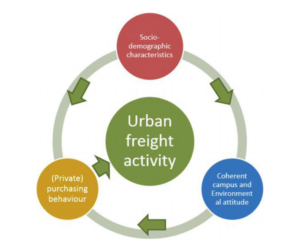Research by University of Newcastle explores the importance of procurement policy and mechanisms in a higher education establishment in order to drive a sustainable approach to inbound logistics. There is little known of the purchasing behaviour at individual level within such organisations.
A localised city logistics Delivery Service Plan, within a ‘coherent campus strategy’ for an academic campus was established at Newcastle University, located at the centre of a medium size British city. P
Purchasing data and interviews with the purchasing manager demonstrated the current state of purchasing practice at the University, relative to the benchmarks established in the literature. In order to better understand the relationships between delivery services, the urban environment, and staff attitudes, a questionnaire was conducted with Newcastle University staff, addressing the purchasing of all goods to be delivered to the workplace.
The research shows that variable frequency in demand can be explained by: job type, the different ways to raise a purchase order, type of goods purchased, expected delivery times, and from where the purchase order originates.
The role of the receiver
The findings suggest that training within specific staff roles would benefit the University’s urban freight coordination and management. A very small core of people raise most of the orders and that, through them, it should be possible to influence the majority of orders.
Demonstrating to the University’s Executive that employee views on private purchasing directly influence the practice, has convinced the board that changing purchasing behaviour towards freight efficiency is a feasible option for a sustainable institutional organisation.
The contribution of the paper by Aditjandra and Zunder (2017) is demonstrating the important role of logistics receiver can make in delivering sustainable city logistics. This is especially true for large organisation, both public and private, with multi-sited and multi-level management (central versus local) that require multi-type of logistics in a city-centred bound historic built environment University. The paper sheds light on identifying the key determinants of freight demand at a University that can be managed and act as catalyst for accommodating urban freight in city planning.
Aditjandra, P. T., & Zunder, T. H. (2018). Exploring the relationship between urban freight demand and the purchasing behaviour of a University. European Transport Research Review, 10 (1), 1.

